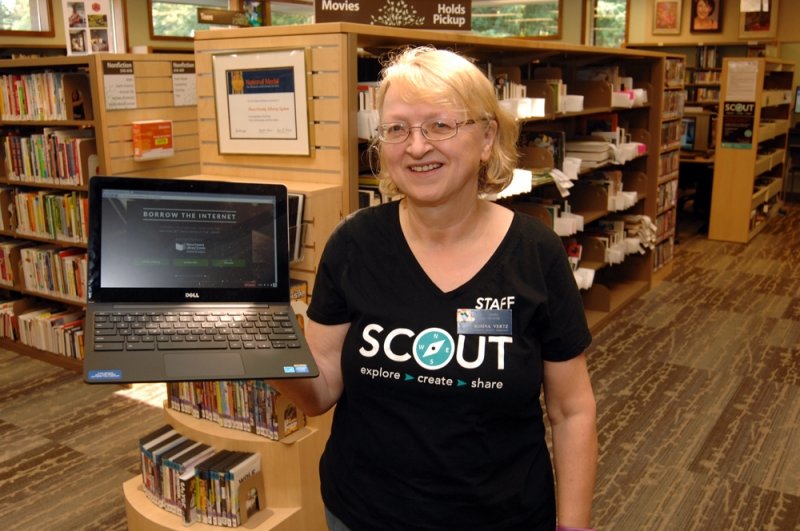 Rosina Vertz, community branch supervisor of the Key Center Library holds up one of her branch’s 10 Chromebook computers she hopes the community will soon start using. Photo by Scott Turner, KP News
Rosina Vertz, community branch supervisor of the Key Center Library holds up one of her branch’s 10 Chromebook computers she hopes the community will soon start using. Photo by Scott Turner, KP News
“This is not your mother’s library any more.”
So said Rosina Vertz, community branch supervisor of the Key Center Library, part of the Pierce County Library System.
She noted they made a fundamental change in philosophy following a study conducted by the county library system and they shifted from providing what they felt was needed to providing what the community wanted.
But the change didn’t occur overnight, because the downturn in the economy in 2007 put the brakes on any changes that were in the works.
“They discovered our branch was too small,” she said, but the expansion plans were put off until 2012 when the budget allowed for the work. The survey looked as far ahead as 2030 and what the community needed. “We’re looking to become a community resource center,” Vertz added.
Even though circulation numbers have decreased in recent years — currently at 180,000 items a year — activity at the library is up. Vertz said e-books have had a direct effect on circulation numbers.
The staff also does a door count, but those numbers dropped when they stopped counting people who use the meeting room. The Brones meeting room (named for Kenneth Brones in recognition of his help in providing the land for the Key Center Library and for his contributions to the community) is an active room used by a number of community and civic groups such as Farm Tour, Toastmasters and homeowners’ associations.
Technology has helped change the shape of the library’s scope as well. As with e-books, e-zines and audiobooks have changed people’sreading habits — although there are still patrons who like to check out something they can hold in their hand and turn a page.
“We still have 100-plus (magazines) on the shelf to check out,” Vertz said.
They added four more computers, bringing the total to 12. There is a two-hour daily limit on computer use, but Vertz noted if someone is working on a resumé, they will let them finish.
The library also received 10 Chromebooks from the county system at the end of July. The building is wired for Internet use and provides free Wi-Fi. Patrons can check out one of the laptops, stay in the library, and work on it all day. They can even print from them. Printing services for outside computers and laptops are not yet available, but could be soon — such is the way the library is adapting, she said.
Another adaptation is the number of classes offered through the library system and staff.
“The services here are almost mindblowing, when you come down to it,” Vertz said. “There are classes here that people haven’t discovered yet.”
Every two months, tech help is offered. Patrons can bring in their e-reader or computer problems and have a one-on-one session to get free help and guidance.
Another class teaches older patrons who may be less computer savvy how to recognize online scams.
Free technology training is offered through Job Track, Tech Readiness and Career Kickstart, a home online service with a once-a-week meeting with library staff to gain software skills such as Word and Excel, or use of Treehouse and Lynda.com to create a customizable WordPress website.
There also is Microsoft IT Academy, teaching the ins and outs of software such as Microsoft Office, Microsoft Server, .Net and more. Certification upon coursework completion is available for a price. The class is free.
But if this is too much change and a patron is feeling a bit nostalgic — one can still check out a book or two.
UNDERWRITTEN BY THE FUND FOR NONPROFIT NEWS (NEWSMATCH) AT THE MIAMI FOUNDATION, THE ANGEL GUILD, ADVERTISERS, DONORS AND PEOPLE WHO SUPPORT INDEPENDENT, NONPROFIT LOCAL NEWS